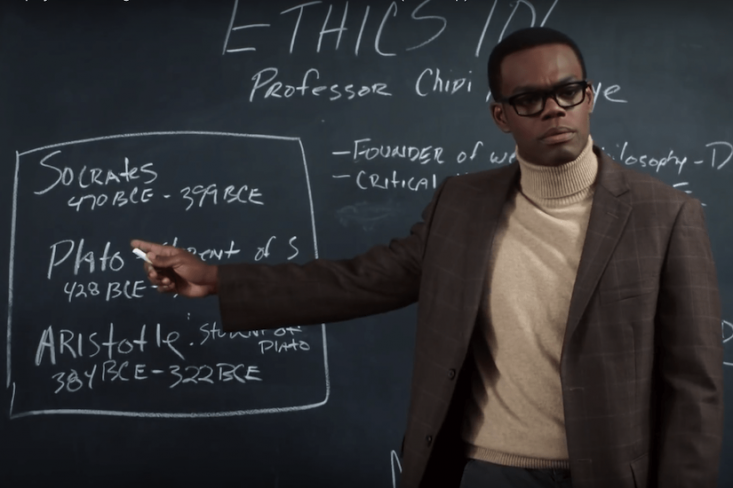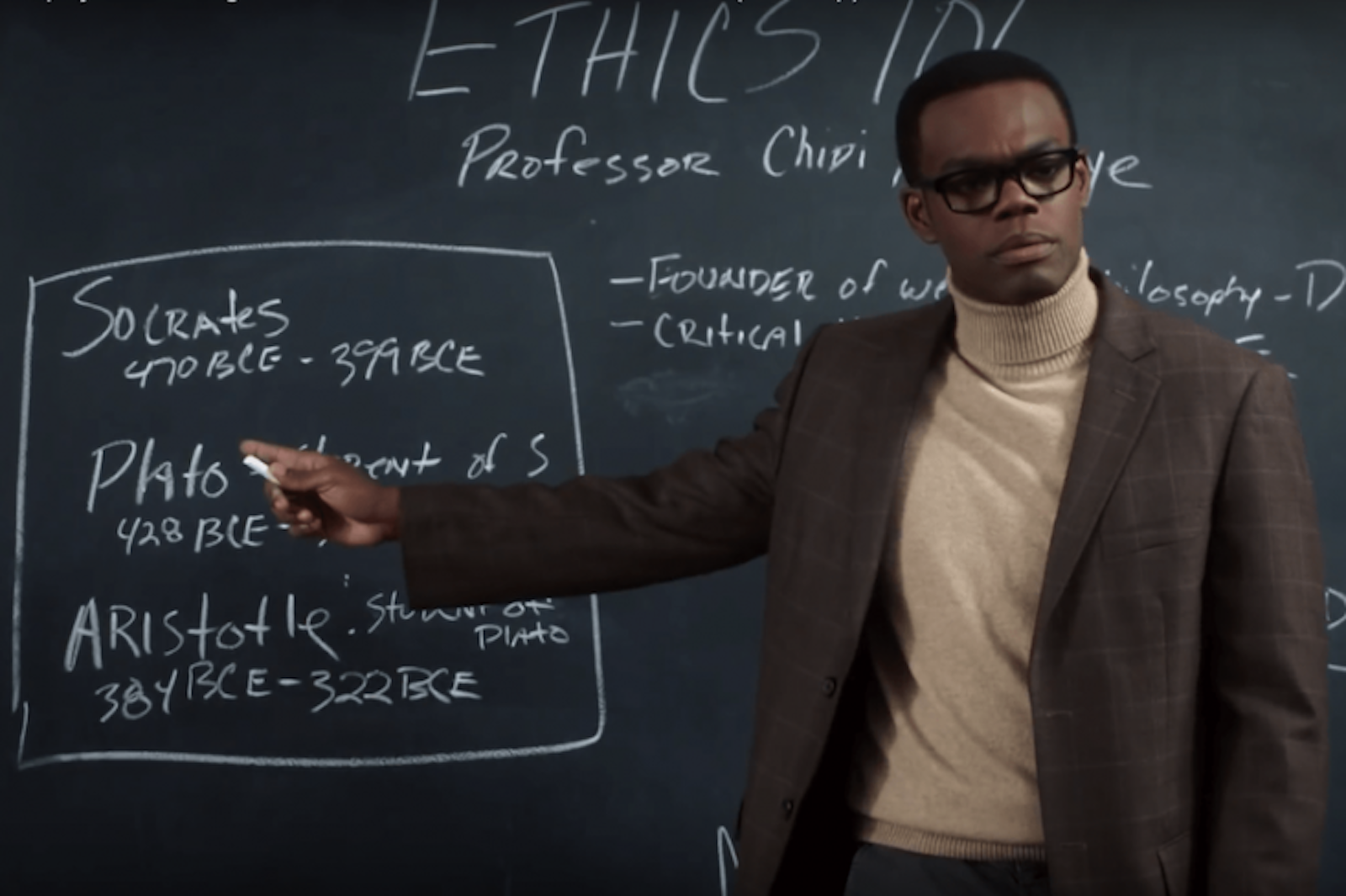
In The Good Place, a cerebral fantasy-comedy TV series, moral philosophy gets teased. On YouTube, the show released a promotional video, “This Is Why Everyone Hates Moral Philosophy,” that gets its title from a line directed at Chidi, a Senegalese professor of moral philosophy who suffers from chronic indecision: The pros and cons of even trivial choices have long paralyzed him. We see him, as a precocious boy, urged to get on with picking teammates for a soccer game. Flustered, Chidi explains, “I have to consider all the factors: athletic strategies, the fragile egos of my classmates, and gender politics! Should I pick a girl as a gesture toward women’s equality, or is that pandering? Or do I think it’s pandering because of my limited male point of view? I’m vexed!” The kids waiting to play shake their heads, facepalming. A friend later insists he “fix his brain.” An M.R.I., courtesy of a neuroscientist named Simone, shows he’s fine. “Wow, there are actual answers here—data you can observe, and learn from,” Chidi says. “Yeah, man! Science is all about getting answers,” Simone replies. “You philosophers can spend your entire life mulling over a single question. That’s why everyone hates moral philosophy professors.” Both of them chuckle and she adds, “No offense.”
This is mock-hate, born of love. Before Mike Schur, the show’s creator, started shooting scenes, he paid a visit to the UCLA moral philosopher Pamela Hieronymi for insight. She’s interested in the sort of control humans have over our intentions and emotions, and how it might differ from control over our actions. Her favorite thought experiment comes from a 1983 paper, “The Toxin Puzzle,” by Gregory Kavka. A delightful head-scratcher, it invites you to imagine that an eccentric billionaire has offered you a deal: If you merely intend to drink a toxin tonight, at midnight, that will make you painfully ill for a day, he will wire you a million dollars—it’ll be in your bank tomorrow morning. A sophisticated and reliable brain scanner will determine whether you really formed the intention to imbibe the toxin. After you have the funds in your bank account, you’re free to decide not to drink it. An easy way to become a millionaire, no? Just intend to drink it for the scanner and, once you have the cash, switch your intention.
The sense of freedom we have to act on our moral understanding is regulated and vulnerable, and can break.
This is absurd, of course, and that’s Kavka’s point: We don’t have that sort of control over ourselves. If you intend to drink it (for the sake of the scanner) but also intend, later, to not drink it (to avoid the sickness), you’re really intending to not drink it. Our intentions are only “partly volitional,” Kavka says. “One cannot intend whatever one wants to intend any more than one can believe whatever one wants to believe. As our beliefs are constrained by our evidence, so our intentions are constrained by our reasons for action.” The sense that you have of being in control, of having free will, is just that—a sense. And it can break.
Clinical neuroscientists and neurologists have identified the brain networks responsible for this sense of free will. There seems to be two: the network governing the desire to act, and the network governing the feeling of responsibility for acting. Brain-damaged patients show that these can come apart—you can have one without the other.
Lacking essentially all motivation to move or speak has a name: akinetic mutism. The researchers, lead by neurologists Michael Fox, of Harvard Medical School, and Ryan Darby, of Vanderbilt University, analyzed 28 cases of this condition, not all of them involving damage in the same departments. “We found that brain lesions that disrupt volition occur in many different locations, but fall within a single brain network, defined by connectivity to the anterior cingulate,” which has links to both the “emotional” limbic system and the “cognitive” prefrontal cortex, the researchers wrote. Feeling like you’re moving under the direction of outside forces has a name, too: alien limb syndrome. The researchers analyzed 50 cases of this condition, which again involved brain damage in different spots. “Lesions that disrupt agency also occur in many different locations, but fall within a separate network, defined by connectivity to the precuneus,” which is involved, among other things, in the experience of agency.
The results may not map onto “free will” as we understand it ethically—the ability to choose between right and wrong. “It remains unknown whether the network of brain regions we identify as related to free will for movements is the same as those important for moral decision-making, as prior studies have suggested important differences,” the researchers wrote. For instance, in a 2017 study, he and Darby analyzed many cases of brain lesions in various regions predisposing people to criminal behavior, and found that “these lesions all fall within a unique functionally connected brain network involved in moral decision making.”
Nevertheless, the fact that brain damage affects moral behavior only underscores the reality that, whatever the “will” is, it isn’t “free.” The sense of freedom we have to act on our moral understanding is regulated and vulnerable, and can break. In a 2016 paper, Darby noted that people who have behavioral-variant frontotemporal dementia “develop immoral behaviors as a result of their disease despite the ability to explicitly state that their behavior is wrong.” This complicates how moral responsibility should be understood, he explains. People can be capable of acknowledging wrongdoing and yet be incapable of acting accordingly. Responsibility can’t hinge on any simple notion of “reason responsiveness,” Darby says, which is a view of how free will can be compatible with determinism—the idea, in the case of behavior, that brain activity causes feelings, intentions, and actions, moral or not.
It’s still not clear whether lay people tend to lean toward “compatibilism” or not. Experimental philosophers have been trying to find out for years, but haven’t landed on a consensus. A recent study explains why: “People are strongly motivated to preserve free will and moral responsibility, and thus do not have stable, logically rigorous notions of free will,” the researchers found. After conducting a series of studies probing people’s philosophical intuitions, the researchers concluded that people seem to be flexible in their views. They don’t have “one intuition about whether free will is compatible with determinism,” the researchers concluded. “Instead, people report that free will is compatible with determinism when desiring to uphold moral responsibility.”
The concept of free will doesn’t make any sense to me. As Kavka’s thought experiment shows, we don’t have much control over our thoughts. Take this article I’m writing: The words I’m committing to print pop into my mind unbeckoned. It’s less me choosing them and more them presenting themselves to me. The act of writing feels more like a process of passive filtration than active conjuration. I’m also convinced that humans can sensibly hold one another morally responsible even if we jettison the idea of free will. The reason is that, as a social mechanism, it has salutary effects. Generally, if people know that they will be held to account for moral violations, they will be less likely to commit them; and if they don’t know what the moral rules are, they will be motivated to learn them. Indeed, in the study on compatibilism, the researchers found that “participants reduced their compatibilist beliefs after reading a passage that argued that moral responsibility could be preserved even in the absence of free will.”
In any case, the mystery of free will isn’t going away anytime soon. In March, a group of neuroscientists and philosophers announced that they’ve received $7 million to study the nature of free will and whether humans have it. Uri Maoz, a computational neuroscientist at Chapman University, is leading the project. “As a scientist, I don’t know what it entails to have free will,” he said in an interview with Science. That’s a philosophical puzzle. But once Maoz’s philosopher colleagues agree on a definition, he can get to work to see if it occurs in humans. “This is an empirical question. It may be that I don’t have the technology to measure it, but that is at least an empirical question that I could get at.”
Maybe, as Chidi said looking at his M.R.I. results, there will be answers there, data we can observe and learn from. Perhaps free will won’t forever be an issue philosophers mull over for a lifetime. Whatever the result, there’s always the ironic answer to the question of whether we have free will: “Of course we do. We have no choice.”
Brian Gallagher is the editor of Facts So Romantic, the Nautilus blog. Follow him on Twitter @BSGallagher.






























